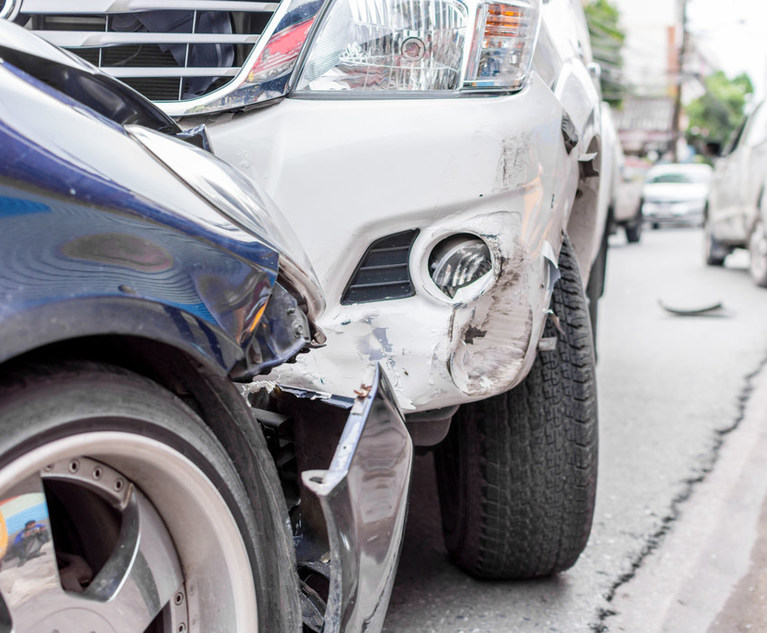 Credit: PongMoji/Shutterstock.com
Credit: PongMoji/Shutterstock.comLack of Available Auto Safety Features Does Not Equal Products Liability Act Violation, NJ Appeals Court Says
“Indeed, to accept plaintiff's design defect argument would be to impose on all purchasers and users of passenger vehicles the requirement and cost of having the [lane departure warning] and [lane-keeping assist] systems installed and activated in their vehicles,” Judge Robert J. Gilson said.
January 02, 2025 at 03:13 PM
4 minute read
In a published opinion, the Appellate Division has sided with Honda Motor Co. by rejecting a claim that a car's lack of safety features constitutes a violation of the New Jersey Products Liability Act.
The precedential ruling in Berkoski v. Honda Motor was issued Thursday by a unanimous three-judge panel. The ruling affirms the lower court's decision to toss the case on summary judgment.
NOT FOR REPRINT
© 2025 ALM Global, LLC, All Rights Reserved. Request academic re-use from www.copyright.com. All other uses, submit a request to [email protected]. For more information visit Asset & Logo Licensing.
You Might Like
View All


2025: A Legal Odyssey—Artificial Intelligence in Products Liability Mass and Class Actions
8 minute read
Can Implied Warranty Claims Proceed in a Products Liability Setting?
7 minute readTrending Stories
- 1Big Law Partner Co-Launches Startup Aiming to Transform Fund Formation Process
- 2How the Court of Public Opinion Should Factor Into Litigation Strategy
- 3Debevoise Lures Another SDNY Alum, Adding Criminal Division Chief
- 4Cooley Promotes NY Office Leader to Global Litigation Department Chair
- 5What Happens When Lateral Partners’ Guaranteed Compensation Ends?
Who Got The Work
J. Brugh Lower of Gibbons has entered an appearance for industrial equipment supplier Devco Corporation in a pending trademark infringement lawsuit. The suit, accusing the defendant of selling knock-off Graco products, was filed Dec. 18 in New Jersey District Court by Rivkin Radler on behalf of Graco Inc. and Graco Minnesota. The case, assigned to U.S. District Judge Zahid N. Quraishi, is 3:24-cv-11294, Graco Inc. et al v. Devco Corporation.
Who Got The Work
Rebecca Maller-Stein and Kent A. Yalowitz of Arnold & Porter Kaye Scholer have entered their appearances for Hanaco Venture Capital and its executives, Lior Prosor and David Frankel, in a pending securities lawsuit. The action, filed on Dec. 24 in New York Southern District Court by Zell, Aron & Co. on behalf of Goldeneye Advisors, accuses the defendants of negligently and fraudulently managing the plaintiff's $1 million investment. The case, assigned to U.S. District Judge Vernon S. Broderick, is 1:24-cv-09918, Goldeneye Advisors, LLC v. Hanaco Venture Capital, Ltd. et al.
Who Got The Work
Attorneys from A&O Shearman has stepped in as defense counsel for Toronto-Dominion Bank and other defendants in a pending securities class action. The suit, filed Dec. 11 in New York Southern District Court by Bleichmar Fonti & Auld, accuses the defendants of concealing the bank's 'pervasive' deficiencies in regards to its compliance with the Bank Secrecy Act and the quality of its anti-money laundering controls. The case, assigned to U.S. District Judge Arun Subramanian, is 1:24-cv-09445, Gonzalez v. The Toronto-Dominion Bank et al.
Who Got The Work
Crown Castle International, a Pennsylvania company providing shared communications infrastructure, has turned to Luke D. Wolf of Gordon Rees Scully Mansukhani to fend off a pending breach-of-contract lawsuit. The court action, filed Nov. 25 in Michigan Eastern District Court by Hooper Hathaway PC on behalf of The Town Residences LLC, accuses Crown Castle of failing to transfer approximately $30,000 in utility payments from T-Mobile in breach of a roof-top lease and assignment agreement. The case, assigned to U.S. District Judge Susan K. Declercq, is 2:24-cv-13131, The Town Residences LLC v. T-Mobile US, Inc. et al.
Who Got The Work
Wilfred P. Coronato and Daniel M. Schwartz of McCarter & English have stepped in as defense counsel to Electrolux Home Products Inc. in a pending product liability lawsuit. The court action, filed Nov. 26 in New York Eastern District Court by Poulos Lopiccolo PC and Nagel Rice LLP on behalf of David Stern, alleges that the defendant's refrigerators’ drawers and shelving repeatedly break and fall apart within months after purchase. The case, assigned to U.S. District Judge Joan M. Azrack, is 2:24-cv-08204, Stern v. Electrolux Home Products, Inc.
Featured Firms
Law Offices of Gary Martin Hays & Associates, P.C.
(470) 294-1674
Law Offices of Mark E. Salomone
(857) 444-6468
Smith & Hassler
(713) 739-1250






